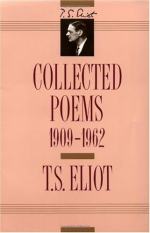
|
| Name: _________________________ | Period: ___________________ |
This test consists of 15 multiple choice questions and 5 short answer questions.
Multiple Choice Questions
1. Which of the following have not "become unsubstantial" in "Marina"?
(a) Those who sharpen the tooth of the dog.
(b) Those who suffer the ecstasy of the animals.
(c) Those who glide with the joy of the lark.
(d) Those who sit in the sty of contentment.
2. Where, in "To the Indians Who Died in Africa," is man's destination said to be?
(a) Death's dream kingdom.
(b) His own village.
(c) The cedar box.
(d) His destiny.
3. What occurred in the past of the location of the fourth Landscape?
(a) Truth.
(b) A carnival.
(c) A tidal wave.
(d) A marriage.
4. Whose carol and crown of fire does the speaker of "The Cultivation of Christmas Trees" remember?
(a) St. Claire.
(b) St. Franics.
(c) St. Nicholas.
(d) St. Lucy.
5. At what door might the speaker of "Eyes that last I saw in tears" see the eyes again?
(a) The door of death's other kingdom.
(b) The door of life's long hall.
(c) The door of dreaming.
(d) The door of death's dream kingdom.
6. The juice of what does Mr. Hodgson press on "his palate fine" in "Five Finger Exercises"?
(a) Fresh young geese.
(b) Fresh cantaloupe.
(c) Strawberries.
(d) Gooseberry tart.
7. What object in "Fragments of an Aristophanic Melodrama" is related to a coffin?
(a) The word "coffer."
(b) The two of spades.
(c) An image of a flowerbox.
(d) A ten-sided playing dice.
8. In Part II of "Four Quartets: Burnt Norton", it is said that what two things are reconciled among the stars?
(a) Man and man.
(b) Truth and judgment.
(c) The boarhound and the boar.
(d) The lion and the lamb.
9. To whom is the praise directed in the tenth chorus of 'The Rock'?
(a) The Holy Theotokos.
(b) God the Holy Spirit.
(c) The Light Invisible.
(d) God the Father.
10. The last line of Part III of "Four Quartets: East Coker" states that "where you are is" where?
(a) Where you are.
(b) Where you have been.
(c) Where you are not.
(d) Where you will be.
11. In "To the Indians Who Died in Africa," whom should a man see in the dust in front of his own door at sunset?
(a) His grandson.
(b) His neighbor.
(c) His children.
(d) His wife.
12. What in Part V of "Four Quartets: Burnt Norton" is said to be "itself unmoving, / Only the cause and end of movement"?
(a) Desire.
(b) Death.
(c) Time.
(d) Love.
13. Where is the speaker at the end of "Four Quartets: East Coker" according to Part I?
(a) His beginning.
(b) His love.
(c) His mind.
(d) His heart.
14. Apprehension of the point of intersection of the timeless with time is the occupation of whom, according to Part V of "Four Quartets: The Dry Salvages"?
(a) The metaphysician.
(b) The saint.
(c) The dying.
(d) The theologian.
15. If the eyes spoken of in "Eyes that last I saw in tears" outlast the tears, in what will they hold the speaker?
(a) Definition.
(b) Derision.
(c) Contempt.
(d) Love.
Short Answer Questions
1. In the second stanza of Part III of "Four Quartets: Burnt Norton", into what world does the speaker say to descend?
2. In the second stanza of "Eyes that last I saw in tears", the speaker says that the eyes he shall not see again are eyes of what?
3. What is the name of the man who phones Doris in "Fragments of an Aristophanic Melodrama"?
4. In "A Note on War Poetry," what two forces are "beyond control by experiment"?
5. The enemy in "Lines for an Old Man" is said to be dangling from what?
|
This section contains 587 words (approx. 2 pages at 300 words per page) |

|




